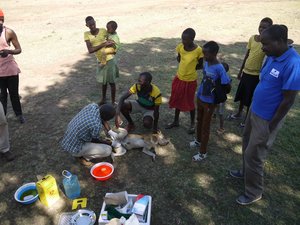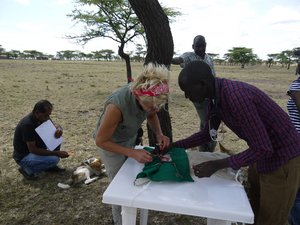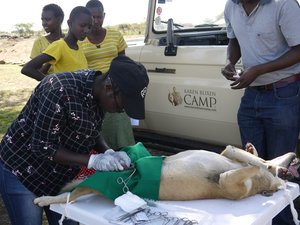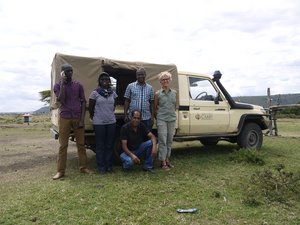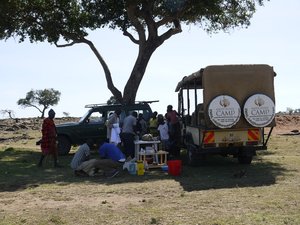Mara North Conservancy Dog Project
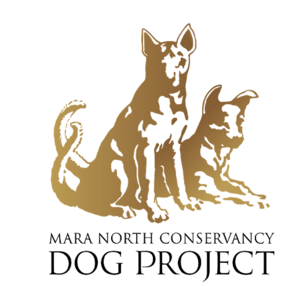
Project manager: Dr. Rikke Langebæk, DVM, PhD, Copenhagen University
Local cooperator: Dr. Gabriel Turasha, BVM (VetAid, Kenya)
Project Advisors:
Stephen DeVincent, DVM, MA (Karen Blixen Camp Trust)
Jesper Stagegaard, PhD (Karen Blixen Camp/Karen Blixen Camp Trust)
Problem analysis:
Domestic dogs are an essential part of the Maasai culture and are used for guarding and protecting livestock from wild animal predators. The guard dogs thereby help reduce the human-wildlife conflicts, which are inevitable in areas where humans and wildlife coexists. However, because of a growing human population, the number of dogs in the Maasai Mara ecosystem is increasing rapidly. This is a challenge because:
- People do not feed their dogs properly (there is often not enough food for themselves), and do not worry about the dogs’ welfare. Many dogs means less food for each.
- Large numbers of intact dogs lead to conflicts (aggression) and abundant reproduction
- The hungry dogs roam and form packs. These packs hunt and kill the wildlife, and steal prey from other (wild) predators. The roaming dogs disturb the wildebeest migration and their calving. Domestic dogs are now the most abundant predator in the Mara ecosystem.
- Dogs carry diseases (incl. parasites) that can transfer to humans and to wildlife. Distemper virus wiped out the wild dogs and decimated the lion population in the Mara/Serengeti ecosystem the 90’ies. Humans (children) are regularly bitten by rabid dogs.
- Local dog owners have no knowledge about dog welfare, behavior or diseases. Basic education is necessary, eg. that fewer, healthier dogs are superior guard dogs compared to many hungry, unhealthy, aggressive dogs.
- Surplus, unwanted puppies are killed in inhumane ways or left to die in the bush, which attracts predators.
- The professional competency level of local veterinary personnel needs to be improved
MNCDog Project is a team of professional veterinarians from DK, US and Kenya, who has the knowledge and expertise in clinical and educational issues. The team’s local veterinarian personnel in the Mara have the respect and the good relationship with the community as well as experience with working in the Mara environment.
Project Goal:
The overall goal is to establish a healthy and sustainable population of Masai guard dogs in Masai Mara’s fragile natural ecosystem in cooperation with local landowners, and ultimately reduce human (dog)/wildlife conflicts and disease transfer. The aims of the project include:
- Reduce disturbance and interference of wildlife by reducing the number of free-ranging domestic dogs
- Improve the health, welfare and working ability in livestock protection dogs
- Reduce transfer of diseases from dogs to wildlife and to humans
- Reduce human injuries from dog bites
- Reduce aggression amongst dogs
- Educate the local human residents in effective dog management and relationship with wildlife
- Provide local and international veterinary students and personnel with skills and competencies relevant in wildlife conservation and management of free-ranging dogs
- Increase knowledge on the health status of the Masai dog
Project description:
The Mara North Conservancy Dog project was launched in August 20 18 to assist Mara North Conservancy and the local community in dealing with the challenges involved in having (too many) domestic dogs. In 2021 the estimated dog population was approx. 3000.
The project was inspired by a 2014 field study from Aarhus University conducted by Master Student Nicolai Elmo Jensen from Aarhus University investigating the possible impact of dogs on wildlife in Mara North Conservancy (MNC). The study concluded that a guard dog management program for the neighboring communities is urgently needed in order to prevent the deleterious effect of dogs on the wildlife, and consequently on the future management plans and conservation of this unique area, as well as financial benefits for the local landowners.
The MNCDog Project includes vaccinations against Rabies, Canine Distemper and Parvo virus, de-worming of dogs, and treatment of mange. Furthermore, performing of spays and castrations of dogs are principal aspects of the project. Awareness is created amongst village elders and pupils in schools (primary/secondary) through presentations and public talks about dog health and population control in local schools and villages.
See a video about the project here
Surgical workshops
The spays and castrations are carried out on owned dogs on a voluntary, informed basis as well as on stray dogs located in the town areas. Under the project leadership of Associate professor, veterinary surgeon Rikke Langebæk, University of Copenhagen, the spay-clinics are being carried out twice a year during 9-day surgical workshops, with the participation of veterinary students from Copenhagen University (DK), Nairobi University (KE) and Tufts University (USA). The surgeries take place in a temporary clinic in Mararienda, based upon regulations provided by the Kenya Veterinary Board. During each workshop, a medical report is performed on each dog and blood and feces samples are taken for health-related research.
During the workshops the participating veterinary students also participate in school presentations and in the vaccination campaign. The vaccinations continue year-round with MNCDog Project’s local partners, Dr. Gabriel Turasha (VetAid) and veterinary technician James Nyatuni, being in charge of this essential part of the project. Approx 2500 vaccinations are carried out each year.
Read about the individual workshops:
Research
In connection with MNCDog project, veterinary master students can carry out research. The following projects have been carried out by summer 2022:
2020: Anna Enevold Fredsted; A study of anesthetic protocols for orchiectomy, ovariectomy and ovariohysterectomy in dogs in a field setting in Masai Mara
2020: Nikita Helene Westhausen & Nikoline Skou Christensen; Gastrointestinal parasites of free-ranging dogs (canis familiaris) & a single african wild dog (lycaon pictus) from the Mara North Conservancy, Southwest Kenya
2022 (on-going): Julie Koch Kvist Bruun & Charlotte Abild Hindsted; The occurance of Hemoparasites in free-ranging dogs in Mara North Conservancy
Education
The MNCDog project has an important educational aspect, in bringing together veterinary students from three countries, and by going to the local schools to engage the schoolchildren in the project, telling them about the importance of having fewer but healthier dogs, about protecting wildlife and finally demonstrating the surgeries on a toy dog.
Read about the school visits July 2021
Maasai community positive about MNCDog project
The project would never succeed without local support from the community – a support that has grown considerable since the start of the project in 2018. This support is due to the successful results so far, but only partly. The main reason for the support is the valuable communication efforts by our local partners and ‘ambassadors’ in Mararienda, David Noosaron from the Mara North Concervancy (MNC) Landowners’ Committee and veterinary technician, James Nyatuni. Through talks and discussions in barazzas, church and school meetings they have explained the importance of vaccinating and de-worming the dogs and also the benefits of castrating and neutering.
The constant awareness of the interconnectedness of elements in this project is essential to its success and long-term impact. It is not an isolated dog-health project, but a holistic conservation project.
Support
MNCDog project has its base at Karen Blixen Camp, who also supports with all the logistics.
Apart from the support from KBCT, the project has received donations from Animal Protection Denmark, Boerhinger/Ingelheim, Englund’s Fund, Ragnhild Bruun’s Fund, as well as a number of veterinary suppliers: Kruuse A/S, e-Vet, and Eickemeier.
